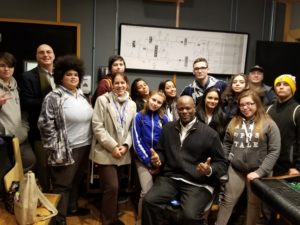
Prince Charles Alexander is a sought-after music producer/audio engineer and a former recording artist. He won three Grammys and garnered more than 40 Platinum and Gold certifications from the RIAA. His clients include P. Diddy, Mary J. Blige, Boyz II Men, Sting and Aretha Franklin. He now teaches advanced production and mixing at Berklee College of Music in Boston, and is an adviser for the Arts, Culture & Design Academy at Atlantis.
Q: Why did you go into teaching?
A: I had become pretty successful with my music goals, and one day I felt like the Platinum records and Grammys had become such a normal thing for me that I wanted another challenge, and that challenge was academia. I started at NYU and then I moved over to Berklee. I never thought that teaching was a path for me. I thought I’d be a performer for the rest of my life, but teaching has been fascinating. It really is interesting. I have learned more about my entire skill set because now I have to teach it and articulate it. It has personally enriched me and enriched my ability to do everything that I do…to be a musician, to be a producer, to be an engineer. All of it has been totally enriched by teaching.
Q: You recently showed a group of Atlantis students around Berklee. Can you tell us about the tour?
A: We toured twelve studios. As we went from studio to studio, I explained to them the concepts of focus and study. I tried to relay to them that being a musician is a skillset that doesn’t have to stop at being a musician. There are other roles such as engineer, producer, manager and booking agent. I want them to see there are so many ways to exist as a musical entity if you are musically inclined.
I also tried to see who could stay focused. During the tour I showed them different size rooms with different size consoles that route microphones. I wanted them to see that the technology is the same, we just shrunk it down and put it into their computer. I could see that a good third to maybe a half of them were making those connections and asking some interesting questions. And it seemed like lightbulbs were going off.
Q: What would you like to see students take away from the Atlantis career academies?
A: Focus and study show up in so many areas of life. You may think making music is fun, but to get to the point where it is really, truly fun, there still needs to be focus and an ability to study some of the fundamental concepts.
Music helped me with my math skills later on in life, and I would hope that a program like this would show students that almost any area of their life could benefit from applying some passion to the studying of whatever it is that might be thrilling for them.
Q: How will what students learn in this class benefit them in college and/or career?
A: First of all, music is very mathematical. It doesn’t have to be taught that way, but there is an ordering that happens in the brain. When you play a major chord or a minor chord, your brain is synthesizing a relationship which usually benefits people. If you are going to pair a guitar player with a drummer there is a social activity going on – two people coming together, trying to work as one to create a composition. Those are skills in our culture and society that are always needed.
If the curriculum also has papers then we can explore expository writing. What do you think about this song? What do you think about the composition you just wrote? I think the musical experience then feeds into the writing experience because it’s not just about music, it’s about being able to express yourself in a document. So, I see lots of benefits across the board. I think it’s the teaching style and the reception by the students that will bear fruit as the students move forward in their careers.
